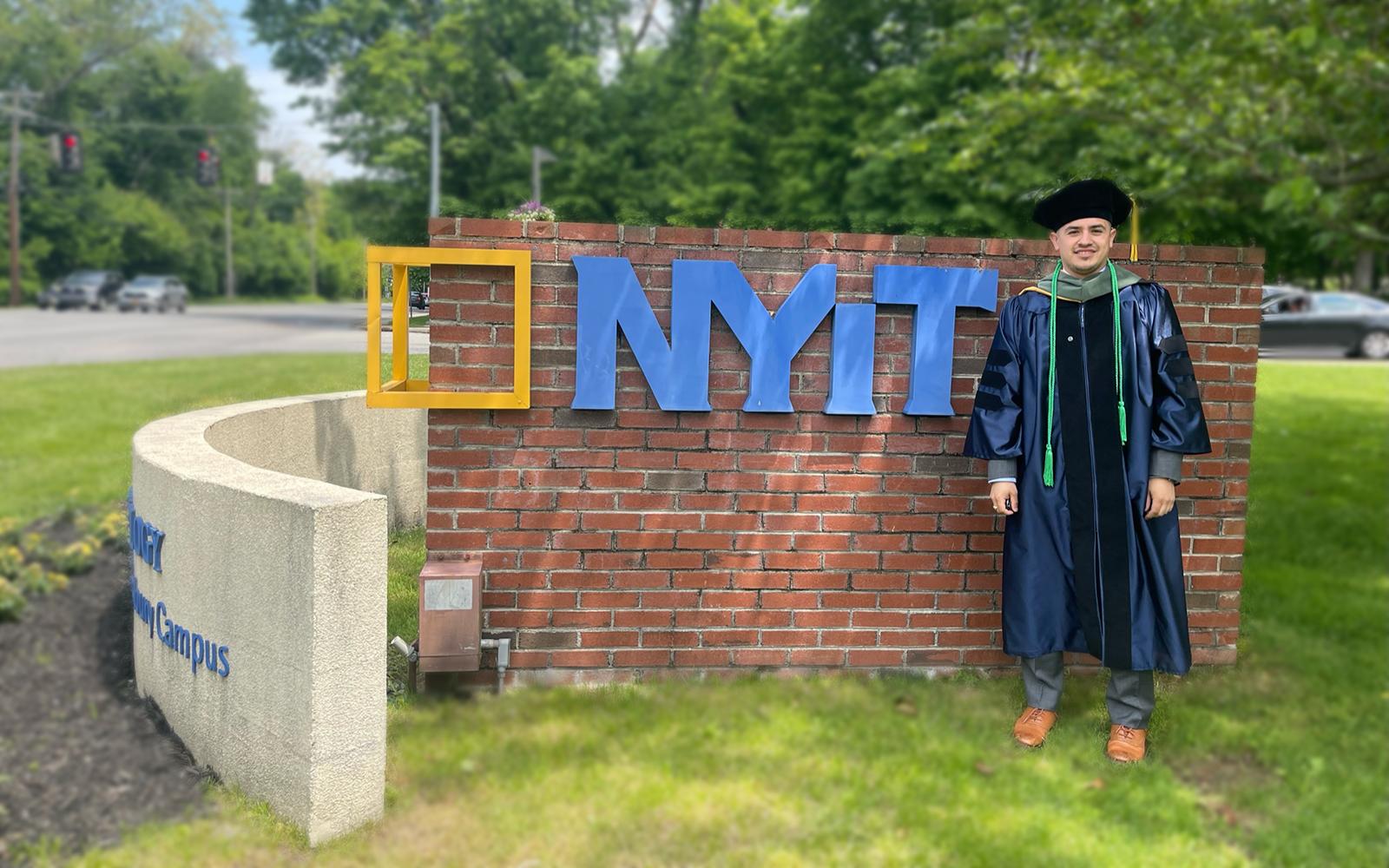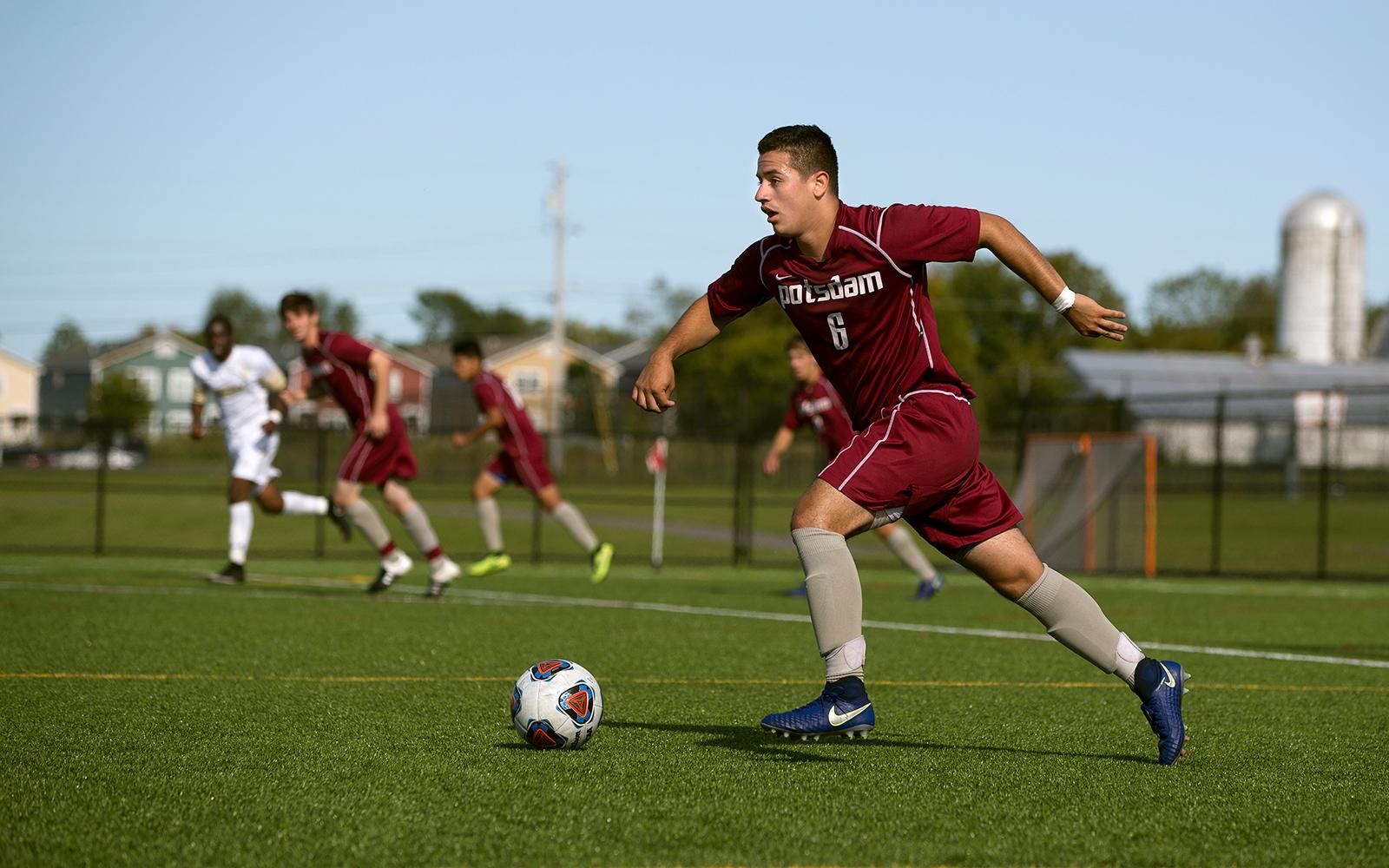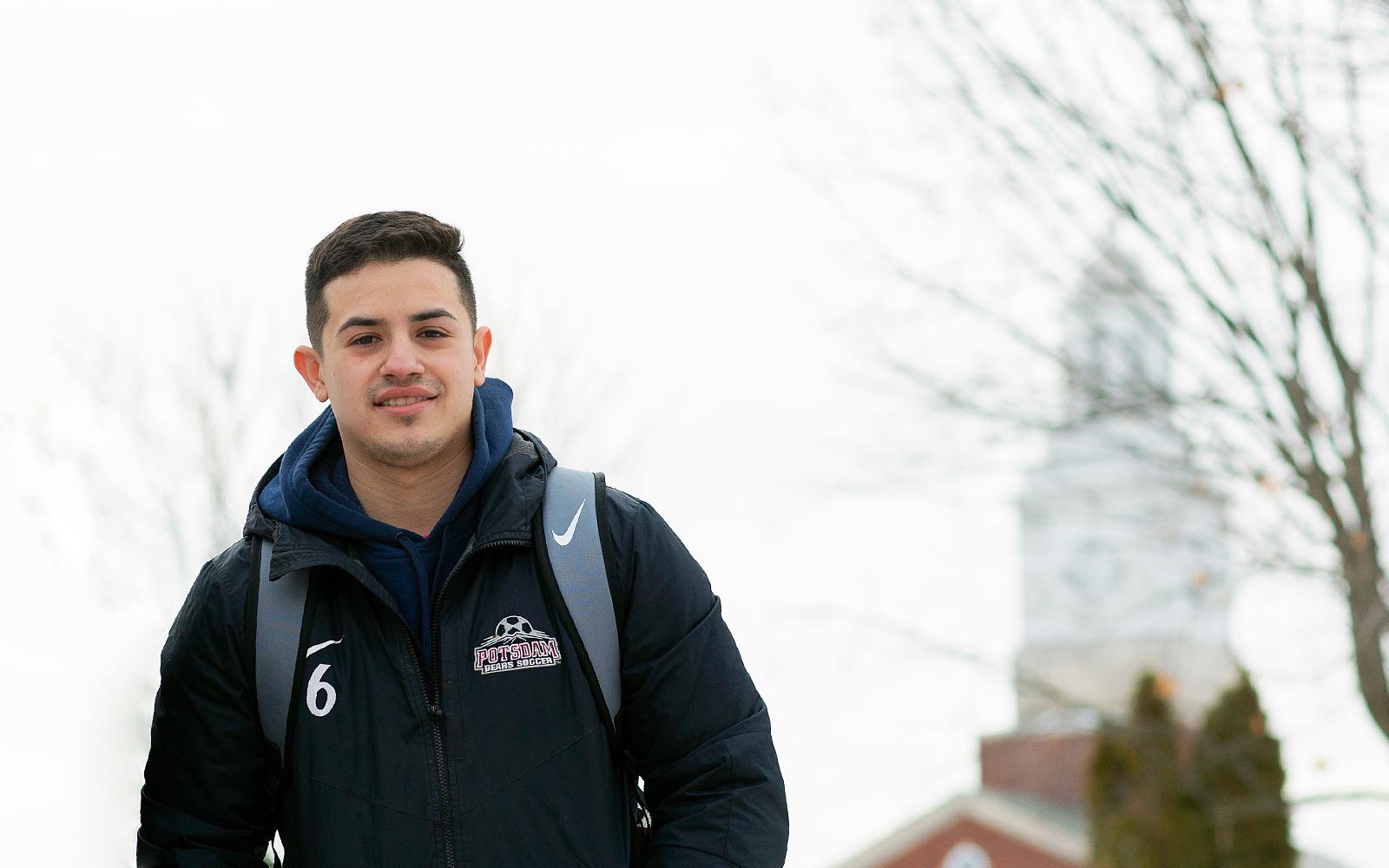When Wilber Parada ’20 arrived at SUNY Potsdam his freshman year as a first-generation college student, he already had a vision for his future. His plans to one day become a Doctor of Physical Therapy would involve years of hard work, completing undergraduate and graduate degrees, and passing the National Physical Therapy Examination.
Seven years later he has made his dream a reality—and in the spring of 2023, Parada was offered a position as a physical therapist at Mount Sinai Hospital, rated one of the top hospitals in the country by U.S. News & World Report. Working within the hospital’s Abilities Research Center, he is starting to conduct research on exoskeletons and robotics with the goal of helping to rehabilitate patients suffering from chronic illnesses.
“It’s very innovative. I anticipate there being a lot more jobs like this in the future, so it’s cool to be part of something that’s a little different and a little new, and just being around the brilliant researchers and clinicians that are part of the team,” he said.

Wilber Parada poses for a photo after completing his Doctor of Physical Therapy degree at the New York Institute of Technology.
Parada’s passion for physical therapy first developed in high school. After breaking his ankle on the soccer field, he sought treatment from an experienced physical therapist on Long Island. As he recovered, and observed the physical therapists in action, he began to envision himself doing similar work one day. When he enrolled at SUNY Potsdam, he started pursuing a dual degree in exercise science and biology, carefully selecting the courses to fulfill the necessary prerequisites for physical therapy school.
“I sat down to talk with Tanya Hewitt (chair of the Department of Public Health and Human Performance) and expressed my interest in physical therapy. She told me what I needed to do throughout my years at SUNY Potsdam to prepare for physical therapy school. The professors at SUNY Potsdam really get to know you. They care about what each student wants to do after they graduate,” he said.
Parada also found support on the Potsdam Bears men’s soccer team. He played all four years and was elevated to the role of team captain his senior year.
“I loved SUNY Potsdam. Being on a soccer team was amazing. I built a lot of friendships and learned a lot about discipline and how to manage responsibilities. It was an amazing time."

During academic breaks, he spent numerous hours shadowing Vinise Mule-Glass, a well-known physical therapist back home on Long Island who has worked with Eli Manning and Muhammad Ali. He also observed physical therapists at the St. Charles Rehabilitation Center—the same clinic where he received treatment back in high school. “I thought that I was just going to sit there and watch and fold towels, but by the end of it, I got pretty involved in looking at the types of treatment they do, and helping set the patient up for the physical therapist,” Parada recalled.
During his senior year, he had his first opportunity to conduct research when Hewitt suggested that he work with Dr. Jason Schreer, who runs the advanced exercise physiology lab on campus. “We were looking at cadence efficiency in cycling. It was a lot of fun. We discovered that if you pedal at 70 revolutions per minute, rather than 50, it was easier. We were analyzing measurements of heart rate, as well as cyclists owe rate of exertion,” he said. “That was my first real exposure to research, All the teachers at SUNY Potsdam were great.”
During his final semester at SUNY Potsdam, he was accepted into his top-choice physical therapy program at the New York Institute of Technology. The three-year program allowed him to delve into research projects more heavily, which included hands-on work at the James J. Peters VA Medical Center. “I was part of a group of scientists working within the national center for the medical consequences of spinal cord injury, and I was specifically part of the thermoregulation team looking at thermoregulation and intervention for individuals with high-level spinal cord injuries,” he said.
His team developed a battery-powered, microprocessor-controlled feedback vest to monitor patients’ skin temperature, a vest that heated up as needed to compensate for a drop in their core temperature and hypothermia. “Individuals who are paralyzed, especially at the cervical level, are not able to thermoregulate. They can’t feel that it’s cold out, and they can’t send those messages to the brain. There are multiple factors of why they can’t thermoregulate, but one of the consequences that arise from having a spinal cord injury the inability to maintain your core body temperature at safe levels,” he said.
His continued research at the undergraduate and graduate levels helped pave the way for his new position at Mount Sinai. Rather than the traditional path of a physical therapist—which often involves helping patients rehabilitate from sports injuries like the one he sustained in high school—Parada is working on the cutting edge of technology within the exoskeleton walking program at Mount Sinai’s Abilities Research Center. Using high-tech equipment like lower-body robotics and powered exoskeletons for walking, he has joined an elite team of medical innovators looking to improve the lives of people with extremity weakness or paralysis caused by a neurological illness or injury.

Parada’s impressive trajectory is even more notable because of the personal struggles he’s dealt with throughout his life. Born in El Savador, he moved to the U.S. with his mother and sister when he was just four years old—a move that reconnected the three of them with their father in New York City. Raised in low-income housing, his family faced financial challenges in his youth, and when he was looking at college options, financial assistance was limited because of his immigration status. “I didn’t qualify for any federal or state aid, so everything was either scholarships or private loans that I took out, so that was difficult. In high school, when I was thinking about college it was like, ‘This may or may not happen,’” he said.
As an immigrant living in the U.S. under the Dream Act, he has been protected from deportation through DACA (Deferred Action for Childhood Arrivals). Every two years he has had to continue applying for DACA to remain in the country, and continue pursuing his degrees and working. Unfortunately, his mother does not have the same protections, and after going through a border patrol checkpoint during his sophomore year of college, she was deported to El Salvador.
“SUNY Potsdam gave me the support I needed at that time, especially Tanya, she was there from day one. It was challenging, but I speak to my mom almost every day and we have a very close relationship. Although I haven’t seen her in six years, things have started to clear up and you can always see the silver lining in things,” he said.
All his mother’s sacrifices, to provide him with a better life for him, have paid dividends as Parada begins his new career as a Doctor of Physical Therapy at Mount Sinai. “This has always been a dream of mine but none of this would have been possible without my family, friends and mentors for consistently pushing me to grow as a person, while, providing me with the support I needed,” he said. “I’m looking forward to working, growing and learning alongside the Abilities Research Center’s brilliant team.”
Article by Jason Hunter
